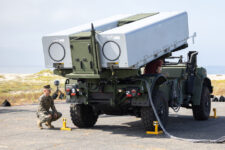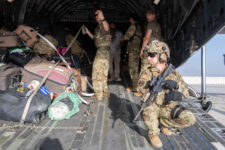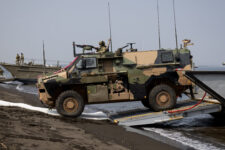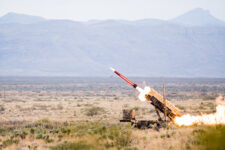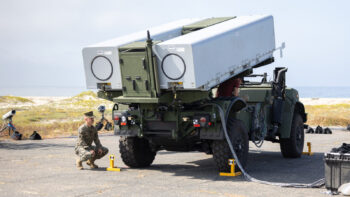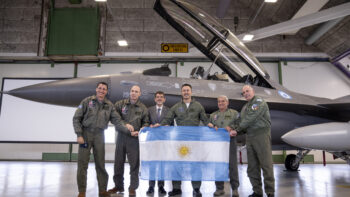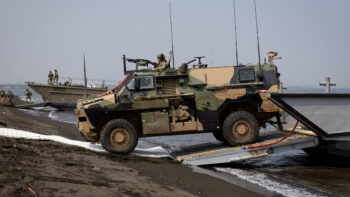
Lt. Gen. Maria Barrett, commander of US Army Cyber Command (left); Lt. Gen. Daniel Karbler, commander of US Army Space and Missile Defense Command (center); and Lt. Gen. Jonathan Braga, commander US Army Special Operations Command (right) speak at the Association of the United States Army conference in Washington, D.C. on Oct. 11, 2022. (Theresa Hitchens / Breaking Defense)
AUSA 2022 — In the wake of Russia’s invasion of Ukraine, US Special Operations Forces have seen increased interest from allies and partner nations in Europe and the Pacific in learning techniques for “resistance” and information war in the event of a foreign occupation of their land, said Lt. Gen. Jonathan Braga. the Army’s SOF commander.
“I think one of the greatest lessons from the Ukraine wars is the power of information ops, influencing relevant populations in the world,” he told reporters on the margins of the annual Association of the United States Army show in Washington, D.C. “There hasn’t been a special operations international military that I have dealt with since the Ukraine crisis that has not talked to us about expanding information operations and psychological operations forces.”
Braga explained that there has been an uptick in requests for training and assistance in crafting what special operators call a “resistance operations concept” — i.e., a plan for how to fight from the inside after an invasion — in particular from allies and partners in the European and Indo-Pacific theaters. This can include material assistance, but also training on skills like using the internet and the media to gather international support. On the latter, he noted, Ukraine has been nothing short of masterful.
RELATED: Army’s military adviser brigades see increased demand in Indo-Pacific, Europe
“You can have a resistance operating concept, but if you don’t have the identity and will to resist as a country and a sovereign nation then you’re probably set up for failure. The Ukrainians obviously have that,” he added.
Lt. Gen. Daniel Karbler, head of Army Space and Missile Defense Command who also spoke at the press conference, said that one piece of a successful resistance movement is simply being able to keep communications networks open so “the message can get out there.”
Ukraine has highlighted that need too, he said, citing the critical assistance provided by SpaceX’s Starlink communications network.
FULL COVERAGE: AUSA 2022
Braga concurred, noting that “even if a nation state doesn’t have the budget to be launching satellites,” the “democratization” of access to space via commercial firms “can actually provide capability from an unconventional warfare standpoint — where you might have a behind-enemy-lines situation where cyberspace might be able to actually deliver an effect or deliver information in denied physical areas.”
Army Special Operations Command has been in discussions with “countries that are well-resourced and have a space program, and some that don’t but they’re still looking how to leverage both cyber and space,” he added.
Braga said, for example, the US has been assisting Ukraine forces with efforts to counter Russia. “We’ve had a supporting role in working with some industry partners to provide some indications and warnings to protect key assets of Ukrainian military,” he said.
“Counter-UAS is a never ending battle right now,” Braga added. “We’re trying to contribute towards both left-of-launch and after launch. So, we’ve contributed partly into providing indications and warnings for some of the forces on the ground, and teaching our Ukrainian counterparts on some of the systems they’ve been provided.”
